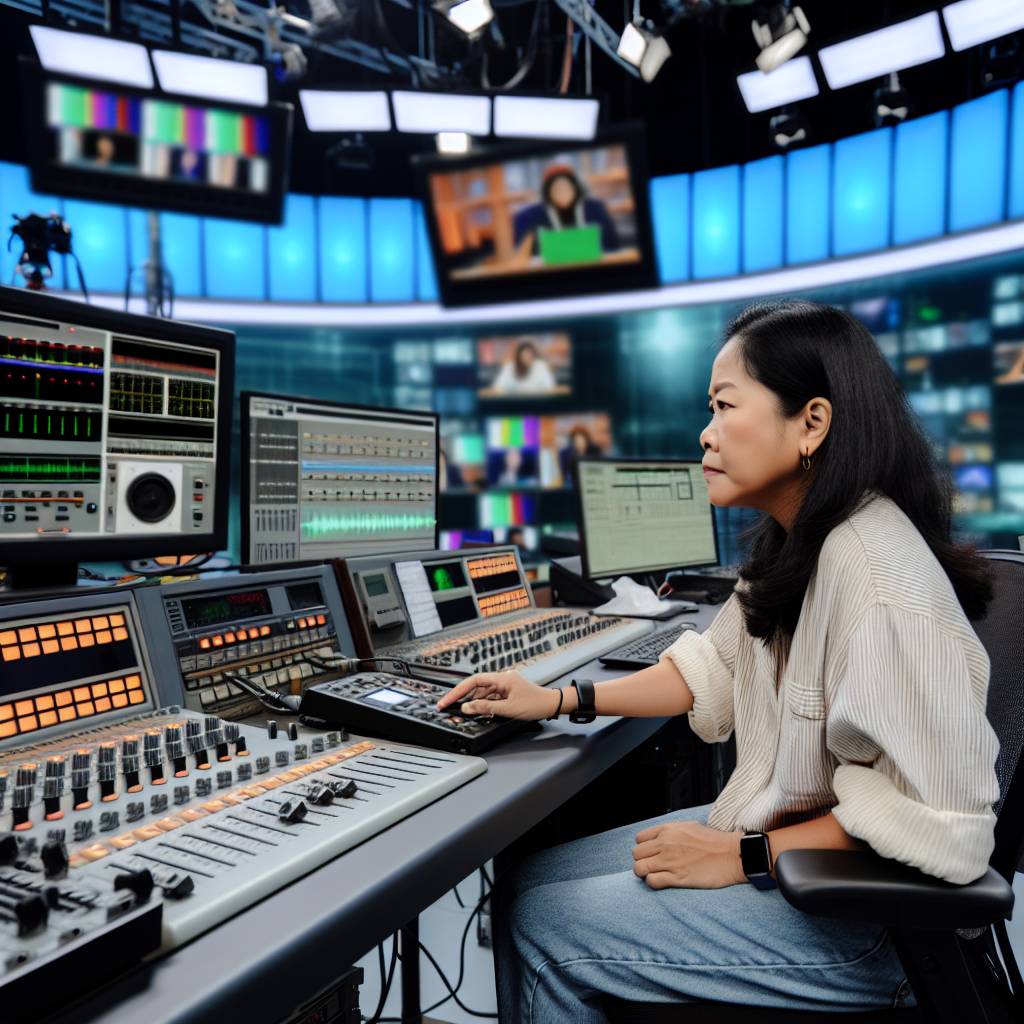Importance of Broadcast Technician Programs
Broadcast technicians ensure seamless transmission of content.
Their expertise supports television, radio, and online media platforms.
These technicians play a vital role in maintaining equipment and troubleshooting issues.
Consequently, their skills are essential for high-quality broadcasts.
Growing Industry Demand
The media industry has experienced rapid growth in recent years.
As more platforms emerge, the need for broadcast technicians increases.
Companies seek professionals who can adapt to new technologies.
This trend creates promising job opportunities for trained technicians.
Skills and Training
Broadcast technician programs cover various essential skills.
Students learn about sound engineering, video production, and equipment maintenance.
Hands-on training is a critical component of these programs.
Practical experience prepares graduates for real-world challenges in broadcasting.
Career Opportunities in Broadcasting
In summary, broadcast technician programs are vital for aspiring media professionals.
They provide the necessary skills to succeed in a competitive industry.
As demand grows, these programs offer excellent career opportunities.
Investing in this education opens doors to a rewarding career in broadcasting.
What is a Broadcast Technician Program?
A broadcast technician program prepares students for careers in media production.
These programs cover various aspects of broadcasting, including audio and video technology.
Graduates often work in radio and television studios, live events, and post-production facilities.
Definition and Scope
A broadcast technician program focuses on training individuals for technical roles in broadcasting.
Transform Your Career Today
Unlock a personalized career strategy that drives real results. Get tailored advice and a roadmap designed just for you.
Start NowStudents learn to operate and maintain equipment used in audio and video production.
The curriculum often balances theory and hands-on experience.
Courses incorporate classroom learning with practical lab work.
Students gain insights into the latest technologies employed in the industry.
Necessary Skills and Knowledge
To succeed as a broadcast technician, specific skills and knowledge are essential.
- Technical Proficiency: Understanding complex broadcasting equipment is crucial.
- Problem-Solving Skills: Technicians must troubleshoot technical problems on the spot.
- Attention to Detail: Precision is vital when dealing with audio and video quality.
- Communication Skills: Technicians often coordinate with other crew members.
- Time Management: Meeting deadlines during production is fundamental.
Areas Covered in a Typical Broadcast Technician Program
A comprehensive broadcast technician program typically encompasses multiple areas of study.
- Audio Engineering: Students learn about sound recording and mixing techniques.
- Video Production: This area covers camera operation, lighting, and video editing.
- Broadcast Equipment Operation: Students gain hands-on experience with mixers and transmitters.
- Broadcasting Standards: Understanding industry regulations and standards is essential.
- Digital Media Technologies: Students explore how digital tools influence broadcast media.
- Live Broadcasting Techniques: Learning to manage live shows increases practical skills.
- Post-Production: Techniques for editing and finishing recorded material are emphasized.
Skills Development for the Broadcasting Industry
A broadcast technician program equips students with essential skills needed for the broadcasting industry.
This rigorous educational path provides both theoretical knowledge and practical skill development.
Ambitious technicians will find numerous career opportunities in this exciting and dynamic field.
Importance of Choosing the Right School
Choosing the right school is a significant decision for aspiring broadcast technicians.
The school you select influences your education, skills, and career opportunities.
Here are several reasons why selecting a reputable school is crucial.
Quality Education and Curriculum
Reputable schools offer quality education and an up-to-date curriculum.
They ensure that students learn the latest technologies and techniques in the broadcasting field.
This education prepares students for real-world challenges and tools they will encounter in their careers.
- Strong curriculum designed to meet industry standards.
- Instructors with real-world experience in broadcasting.
- Access to cutting-edge technology and equipment.
A well-rounded education equips students with diverse skills.
Knowledge in audio, video, and graphics enhances employability opportunities.
Additionally, schools with strong industry ties often update their curriculum regularly.
Hands-On Experience
Hands-on experience is essential for broadcast technicians.
Showcase Your Business Today
Reach thousands of readers actively exploring professional services. Publish your business profile and grow your audience now.
Publish NowPractical learning reinforces theoretical concepts and prepares students for their future jobs.
A good school provides ample opportunities for students to gain hands-on experience.
- Internships at local television and radio stations.
- On-campus studios and labs for practice.
- Student projects that mimic real-world scenarios.
Internships allow students to work alongside professionals.
They learn about industry practices and develop crucial skills.
Additionally, on-campus facilities enable students to experiment with equipment and techniques.
Networking Opportunities
Networking plays a vital role in the broadcasting industry.
Connections can lead to internship opportunities, job placements, and mentorships.
A reputable school often has established relationships with industry leaders.
- Guest lectures from successful industry professionals.
- Career fairs connecting students with employers.
- Alumni networks that facilitate job connections.
Guest lectures offer insights into the industry landscape.
Students can ask questions and seek advice from experienced professionals.
Career fairs provide platforms for students to meet potential employers face-to-face.
Reputation and Job Prospects
The reputation of a school significantly impacts future job prospects.
Employers often prefer graduates from recognized institutions.
A school’s credibility can enhance a graduate’s resume and job competitiveness.
- Employers’ preference for graduates from reputable schools.
- Positive school reputation increases job interview opportunities.
- Strong alumni success stories attract employers.
Graduates from well-regarded schools are often seen as more qualified.
This perception can lead to higher starting salaries and better job positions.
Furthermore, successful alumni often return to help recent graduates.
Access to Resources
Reputable schools provide a range of resources for students.
These resources enhance the learning experience and overall education quality.
Access to libraries, professional software, and mentorship can make a significant difference.
- Cutting-edge technology for hands-on practice.
- Extensive library resources for research and study.
- Mentorship programs connecting students with industry experts.
Cutting-edge technology allows students to familiarize themselves with industry-relevant tools.
Extensive library resources give students access to literature, scripts, and case studies.
Mentorship programs can guide students in developing their skills and careers.
Financial Considerations
While pursuing education in broadcasting, financial considerations matter.
A reputable school may have higher tuition fees, but they often provide better financial aid opportunities.
Scholarships and grants can ease the financial burden.
- Availability of scholarships based on merit or need.
- Financial aid resources for guidance and support.
- Possible return on investment with higher salaries.
Financial aid offices help students navigate funding options.
Scholarships reward students for academic achievements and talents.
Investing in a quality education may lead to better job prospects and returns in the long run.
Consideration of Location
The location of a school also plays a crucial role.
Being situated in a media-rich environment can provide access to various broadcasting opportunities.
Additionally, urban schools often offer more networking options.
- Proximity to major media outlets and networks.
- Access to entertainment and broadcasting events.
- Opportunities for local internships and job placements.
Schools close to major media hubs can facilitate internships and job placements.
Attending events in nearby cities helps students to connect with industry professionals.
These connections can lead to internships and job offers in the future.
Effective Support Services
Effective support services can enrich the educational experience.
Reputable schools typically offer career services, counseling, and tutoring.
These services support students in achieving their academic and career goals.
- Career services for resume building and interview preparation.
- Counseling services for academic and personal challenges.
- Tutoring options for difficult subjects or skills.
Career services equip students with tools to secure jobs.
They provide resources for resume writing and interview preparation.
Showcase Your Business Today
Reach thousands of readers actively exploring professional services. Publish your business profile and grow your audience now.
Publish NowCounseling services address personal challenges that may affect academic performance.
Find Out More: The Art of Storytelling in Television Production
Top Schools Offering Broadcast Technician Programs
Broadcast technicians play a crucial role in the media industry.
They ensure the smooth operation of audio and video equipment.
If you’re considering a career in broadcast technology, attending a top school can set you on the right path.
Below, we highlight several outstanding institutions that offer comprehensive broadcast technician programs designed to equip you with essential skills.
Full Sail University
Full Sail University, located in Winter Park, Florida, is renowned for its hands-on approach to education.
The Digital Cinematography Bachelor’s Degree focuses on the technical and creative aspects of media production.
The curriculum covers various subjects, including digital imaging, audio production, and post-production.
This well-rounded program prepares students for diverse roles in the broadcasting world.
The faculty at Full Sail consists of industry professionals.
Many have worked in major studios and production houses.
Their real-world experience enhances classroom learning and offers valuable insights.
The university also boasts state-of-the-art facilities.
Students have access to sound stages, production studios, and editing suites.
Full Sail’s unique partnership with several industry leaders provides students with internship opportunities.
By working with companies like WESH-TV and the Orlando City Soccer Club, students gain real-world experience.
This exposure often leads to job offers upon graduation.
Columbia College Chicago
Columbia College Chicago offers a comprehensive Bachelor of Arts in Television.
This program emphasizes both the technical and artistic elements of broadcasting.
Students explore topics such as production techniques, scriptwriting, and digital media.
The curriculum prepares graduates to excel as broadcast technicians and creatives.
Columbia’s faculty includes award-winning professionals in the broadcasting field.
Students can expect mentorship from those with extensive industry experience.
The college provides top-notch facilities, including a fully equipped TV studio and control room.
These resources allow students to gain practical experience in a real-world setting.
A unique feature of Columbia College is its strong emphasis on community engagement.
Students have opportunities to work on public access television projects, allowing them to connect with local organizations.
This real-world experience proves invaluable in career development.
DeVry University
DeVry University’s Associate Degree in Electronics and Computer Technology includes a focus on broadcast technology.
The curriculum covers crucial areas like video production and audio engineering.
Students learn to operate and troubleshoot broadcasting equipment, ensuring they are job-ready upon graduation.
The faculty at DeVry University is composed of experienced professionals.
Many have backgrounds in broadcasting, providing students with industry insights.
The university features advanced labs and technical resources.
These facilities simulate real-world broadcasting environments, enhancing hands-on learning.
DeVry collaborates with several tech companies and media organizations.
This partnership allows students to participate in internships and job placement programs.
Graduates often find employment due to the university’s strong connections within the industry.
Connecticut School of Broadcasting
Connecticut School of Broadcasting (CSB) specializes in preparing students for careers in broadcasting.
Showcase Your Business Today
Reach thousands of readers actively exploring professional services. Publish your business profile and grow your audience now.
Publish NowThe Broadcasting and Audio program focuses on radio, television, and digital media.
The intensive curriculum covers topics such as announcing, production, and digital marketing.
The faculty at CSB consists of seasoned professionals who have worked in the industry.
Their backgrounds lend credibility and expertise to the program.
CSB is equipped with modern broadcasting studios and editing suites.
Students benefit from practical, hands-on experience using industry-standard equipment.
One unique aspect of CSB is its extensive alumni network.
Graduates often remain connected and support each other’s career growth.
This network can provide job leads and mentorship opportunities, enhancing students’ prospects after graduation.
Penn State University
Penn State University offers a Bachelor of Arts in Broadcast Journalism that equips students with fundamental skills in broadcast technology.
The rigorous curriculum covers multimedia production, reporting, and ethics in media.
Students learn to create compelling stories for various platforms, including television and online media.
The faculty at Penn State consists of experienced professionals and scholars.
Their diverse backgrounds enrich the learning experience.
The university has state-of-the-art facilities, including a fully equipped news studio.
These resources allow students to gain hands-on experience in a professional setting.
Penn State has strong partnerships with local and national media outlets.
These connections often result in internship opportunities for students.
These experiences provide direct exposure to industry practices, enhancing employability after graduation.
New York University (NYU)
New York University offers a prestigious Bachelor of Fine Arts in Film and Television program.
This program enables students to delve deeply into various aspects of broadcast media.
The curriculum includes production, cinematography, and editing courses.
Students receive extensive training and hands-on experience in diverse media environments.
The faculty at NYU boasts a remarkable roster of industry experts.
Students benefit from their knowledge and extensive professional networks.
NYU offers access to cutting-edge facilities, including sound stages and post-production suites.
These resources facilitate practical learning experiences that are invaluable for aspiring technicians.
NYU also encourages students to participate in film festivals and competitions.
These opportunities allow students to showcase their work and gain recognition.
The exposure can lead to networking opportunities and career advancements.
Miami Dade College
Miami Dade College offers a diverse range of programs in broadcasting through its School of Entertainment and Design Technology.
The Associate in Science in Film, Television, and Digital Production provides comprehensive training in various media technologies.
Students focus on hands-on learning, mastering industry-standard equipment and software.
The faculty is comprised of experienced professionals from the film and television industry.
Their expertise ensures that students receive top-notch education.
Miami Dade College boasts modern facilities, including sound stages and production labs.
These resources are crucial for practical training in broadcast technology.
A unique feature of Miami Dade College is its strong community focus.
Students get involved in local media projects that enhance their skills.
This community engagement fosters connections that can be beneficial when entering the industry.
Showcase Your Business Today
Reach thousands of readers actively exploring professional services. Publish your business profile and grow your audience now.
Publish NowChoosing the right school is essential for aspiring broadcast technicians.
Each of these institutions offers valuable programs and resources.
Consider your personal and professional goals as you evaluate these opportunities.
A strong education in broadcast technology can pave the way for a successful career in the media industry.
Delve into the Subject: Emerging Trends in Media Research and Analysis
When considering a career as a broadcast technician, understanding the admission requirements and application process at leading schools is crucial.
Each institution has its own set of criteria, and knowing them can help you navigate your path.
In this section, we will cover admission requirements, the application process, and some tips to enhance your chances of acceptance.
Admission Requirements
Admission requirements for broadcast technician programs vary by school, but some common elements recur across many institutions.
Here’s a detailed breakdown:
- High School Diploma or Equivalent: Most programs require at least a high school diploma or GED. Strong performance in math and science courses is advantageous.
- Prerequisite Courses: Some institutions expect applicants to complete specific foundational courses, such as electronics, audio/video production, or computer technology.
- Minimum GPA: A competitive GPA, typically around 2.5 to 3.0, may be necessary for admission. Higher GPAs improve chances, especially in more selective programs.
- Standardized Test Scores: Certain schools might ask for SAT or ACT scores. Check individual school requirements to see if tests are obligatory.
- Portfolio: Some programs may ask for a portfolio showcasing relevant work or projects. This is common if you have a background in media or technology.
- Letters of Recommendation: Most institutions require at least one or two personal or academic references. These letters should speak to your skills and character.
- Personal Statement: Applicants often need to submit a personal statement. It should outline your passion for broadcasting and career goals.
- Interview: Some schools may require an interview as part of the admissions process. Prepare to discuss your interests and experiences related to broadcast technologies.
Application Process
The application process involves multiple steps, and being organized is crucial.
Here’s a detailed outline:
- Research Programs: Start by identifying schools that offer strong broadcast technician programs. Review each program’s curriculum and focus areas.
- Gather Documents: Collect all required documents early. This includes transcripts, test scores, letters of recommendation, and your personal statement.
- Online Application: Most schools use an online application system. Complete the application form carefully. Proofread your entries to avoid errors.
- Application Fee: Be prepared to pay an application fee. Fees typically range from $50 to $100, depending on the school.
- Submit Application by Deadline: Track application deadlines closely. They often fall in early spring for fall admissions. Submit your application early to reduce stress.
- Follow Up: After submission, confirm that your application and documents are received. Most schools send a confirmation email.
- Prepare for Interviews: If an interview is part of the process, practice common questions. Be ready to articulate why you want to join the program.
- Await Decisions: After interviews, patiently wait for admission decisions. Schools typically notify candidates via email or postal mail.
Tips to Increase Chances of Acceptance
Increasing your chances of acceptance into a competitive broadcast technician program requires strategic planning and effort.
Here are valuable tips:
- Focus on Grades: Maintaining a strong academic record is vital. Prioritize your studies, especially in relevant subjects like math and technology.
- Gain Relevant Experience: Participate in internships, volunteer opportunities, or part-time jobs in media or broadcasting. This experience enhances your application.
- Enhance Your Portfolio: If required, create a standout portfolio. Include projects that showcase your skills in video editing, sound engineering, or broadcasting.
- Network: Attend industry events or connect with professionals in the field. Networking can provide valuable insights and potential reference opportunities.
- Research each Program: Tailor your personal statement to each program. Show how your goals align with what the program offers.
- Prepare Thoroughly for Interviews: Practice answers to questions typically asked in interviews. Demonstrate your passion for the broadcasting field.
- Seek Feedback: Ask for feedback on your personal statement or portfolio from teachers or professionals. Constructive criticism can help you improve.
- Meet All Requirements: Double-check that you meet all admission criteria before applying. Incomplete applications can lead to automatic rejections.
Navigating the admission requirements and application process for broadcast technician programs can seem daunting.
However, understanding what schools expect can help simplify the journey.
By gathering necessary documents, preparing effectively, and showcasing your passion for broadcasting, you can enhance your chances of acceptance.
Your dedication and preparation will play significant roles in your success.
Follow these guidelines, and you will be well on your way to a rewarding educational experience in broadcast technology.
Delve into the Subject: Common Mistakes Media Relations Specialists Make

Understanding the Financial Aspects of a Broadcast Technician Program
Pursuing a career in broadcasting can be rewarding. But it often comes with financial challenges.
This field requires specialized education and training. Understanding the financial requirements becomes essential for prospective students.
Below, we discuss various financial aid options. We also provide guidance on managing expenses during your studies.
Tuition Costs and Expenses
First, it’s crucial to know the costs associated with attending a broadcast technician program.
Tuition varies by institution and program length. Some key factors influencing costs include:
- Type of school (community college vs. university)
- Location of the institution
- Duration of the program
- Course materials and resources required
On average, students can expect to pay between $3,000 to $15,000 per year for tuition.
Additionally, consider living expenses, transportation, and supplies.
All these elements contribute to the overall cost of education.
Financial Aid Overview
Fortunately, several financial aid options are available for students pursuing a broadcast technician program.
Exploring these options can lessen the financial burden.
Here, we discuss scholarships, grants, and loans.
Scholarships
Scholarships can provide significant help in funding your education.
These awards do not require repayment. Numerous organizations offer scholarships specifically for students in broadcasting and media studies.
Notable scholarships include:
- The Broadcast Education Association Scholarship: Supports undergraduate students pursuing a degree in broadcasting.
- National Association of Broadcasters Education Foundation: Offers scholarships to students in broadcast-related fields.
- Women in Film and Video Scholarships: Aids women pursuing careers in media and entertainment.
- Local Media Organizations: Many regional broadcasters provide scholarships to local students.
Grants
Grants are another beneficial option.
These funds usually come from federal or state governments. Like scholarships, grants do not need repayment.
Key grant options to consider include:
- Pell Grant: Federal aid based on financial need.
- Federal Supplemental Educational Opportunity Grant (FSEOG): For students with exceptional financial need.
- State Education Grants: Many states offer grants for residents pursuing higher education.
Loans
If scholarships and grants do not cover the entire cost, students can explore loans.
Loans must be repaid, which requires careful consideration. There are two main types:
- Federal Student Loans: Often have lower interest rates and flexible repayment options.
- Private Loans: Offered by banks or credit unions, typically with higher interest rates.
How to Apply for Financial Assistance
Applying for financial aid can seem daunting. But the process is straightforward.
Showcase Your Business Today
Reach thousands of readers actively exploring professional services. Publish your business profile and grow your audience now.
Publish NowHere are the steps students can take:
- Complete the FAFSA: Fill out the Free Application for Federal Student Aid online. This determines eligibility for federal loans and grants.
- Research Scholarships: Look for scholarships relevant to your field and apply early.
- Check with Your School: Many schools have financial aid offices offering additional resources.
- Keep Track of Deadlines: Make sure to meet all application deadlines to maximize funding opportunities.
Managing Expenses While in School
While financial aid can significantly reduce college expenses, managing costs remains crucial.
Here are some effective strategies:
- Create a Budget: Outline your expected income and expenses to manage your finances better.
- Limit Unnecessary Expenses: Cut back on non-essential items or services.
- Consider Part-Time Work: Look for jobs that offer flexible hours to accommodate your studies.
- Utilize Student Discounts: Many businesses offer student discounts on various products and services.
By carefully considering your financial situation and seeking appropriate aid, you can focus on your studies.
Excel in your broadcast technician program.
Discover More: How to Create a Successful Brand Campaign
Choosing the Right School for Broadcast Technicians
In this blog post, we explored top schools offering broadcast technician programs.
We highlighted the importance of quality education in this field.
Choosing the right institution directly influences career success for aspiring technicians.
A well-chosen program equips students with necessary skills and practical experience.
The key points discussed include rigorous curricula, advanced technology access, and expert faculty.
Additionally, we noted the significance of hands-on training through internships and lab work.
Networking opportunities provided by schools also enhance career prospects.
Graduates from reputable programs often find better job placements in competitive environments.
When pursuing a broadcast technician program, it is essential to prioritize personal interests and career goals.
Researching various schools can lead to informed decisions.
Consider factors such as location, cost, and program reputation.
Aspiring broadcast technicians should visit campuses, interact with faculty, and evaluate the facilities.
Investing in education is crucial for success in the broadcast industry.
Hands-on training and real-world experience significantly enhance job readiness.
Therefore, prospective students should thoroughly investigate their options.
A strong foundation in technology and communication prepares them for future challenges.
The right school can make all the difference in pursuing a broadcast technician career.
Educational choices will shape your skillset, knowledge, and future opportunities.
By dedicating time to research, students can ensure they receive the best education possible.
This diligence will pay off in their professional journey, leading to a fulfilling and successful career.
Additional Resources
Broadcast, Sound, and Video Technicians : Occupational Outlook …
School of Communication | American University, Washington, DC




